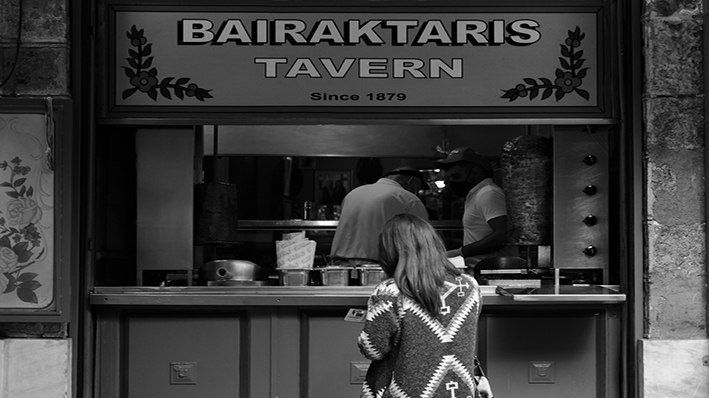
Alexandros Michailidis/shutterstock.com
Eva souvlaki parakalo!
My Athenian acolyte, and longtime roommate, turns away from the counter and smiles at me. We’re in one of the oldest Gyros shops of Athens, and he’s just managed to order a…
Pita with
Chicken and
Onion, tomatoes,
Fried potatoes,
Lettuce,
Tzatziki and
Paprika
The culinary poem he’s about to eat has put him in a state of pure happiness. Understandable.
EVERY 3RD CORNER
It seems there’s a golden mathematical rule stating that in Athens, there’s a gyros place at the third corner of every street.
Gyros restaurants have their own rules.
The orders are taken by a person at the counter, most of the time a woman in her forties or fifties, who nonchalantly screams the order at the kitchen staff, that is no longer a kitchen staff but a sweat-invaded orchestra of sound – pshhh, there goes, the potatoes drowned in the oil, the slick move of the steel against the greasy flesh of chicken and lamb, woosh, the hot air coming out of the stove, and pffff, the sigh of the butcher-like man that takes off his mask for a millisecond, dripping tears of sweat down his shirt, he is so wet he could slip on the floor.
their dance
Customers wait outside, looking in, dazzled by the performance of the staff, lingering with impatience for the final product. The heat is so loud and heavy that when they stare too much, their eyes confuse the body of the cook with that of the animal skewed on a metal stick, turning and turning at the mercy of the flickering flame that comes out of the stove, bits of flesh burned here and there, a rainbow of black and red and grey, a swimming pool of blood and carbon and oil at its feet.
When the order arrives, meat wrapped in tomatoes wrapped in French fries wrapped in a pita wrapped in a napkin, when the greasy butcher-like man hands it to you through the kitchen window, there’s a moment.
A split second of ataraxia.
A tranquility of the soul.
An utmost content with oneself.
no debate
Some would argue this sensation is universal. The gyros has become the poster child of Greek cuisine all around the world – walking in Paris on a late Saturday night you might find yourself ordering, to put it simply: “un grec, avec tomate oignon et sauce algerienne steuplé”. (“A Greek, with tomatoes, onions, and algerian sauce please.”)
I often wonder what it would feel like to order other iconic meals calling them by their country of origin. Instead of a baguette, just order a French, instead of tea, order an English, instead of a spread, order a German, and for a good healthy breakfast, order the three of them!
You might also muster the word “kebab”, your eyes thirsting over an Athenian menu in the oldest Gyros shop of Exarcheia (49 years and still standing!), but here’s a tip: never say “kebab” to a Greek, he does not need to be reminded half of his cuisine and culture actually comes from Turkey.
Four-hundred years of Ottoman occupation suffices.
every evening
While the gyros are dear to the hearts of the Greeks, confined in the wonders of their culture and to none other, gyros restaurants are places that transcend social separation and urban segregation.
Around the late hours of Greek evenings, dozens of twenty-somethings pour onto the street, coming out of open-air cinemas, joined by old tourist couples, temporary residents, refugees, and cops alike towards their common Mecca
FOR A MOMENT
I’m not saying Gyros shops erase the police harassment temporary residents have to face every day: “I’ been here 5 years,” says Christopher, born in Congo, as we smoke cigarettes at Exarchia Square.
“I always have my papers on me. I’m in check, but they keep coming, looking at my papers. Makes me angry.” But, for a moment there, we all live in the temporary illusion that the world is at peace.
About the Article
A subjective look at a street with one of the oldest Gyros shops in Athens.



